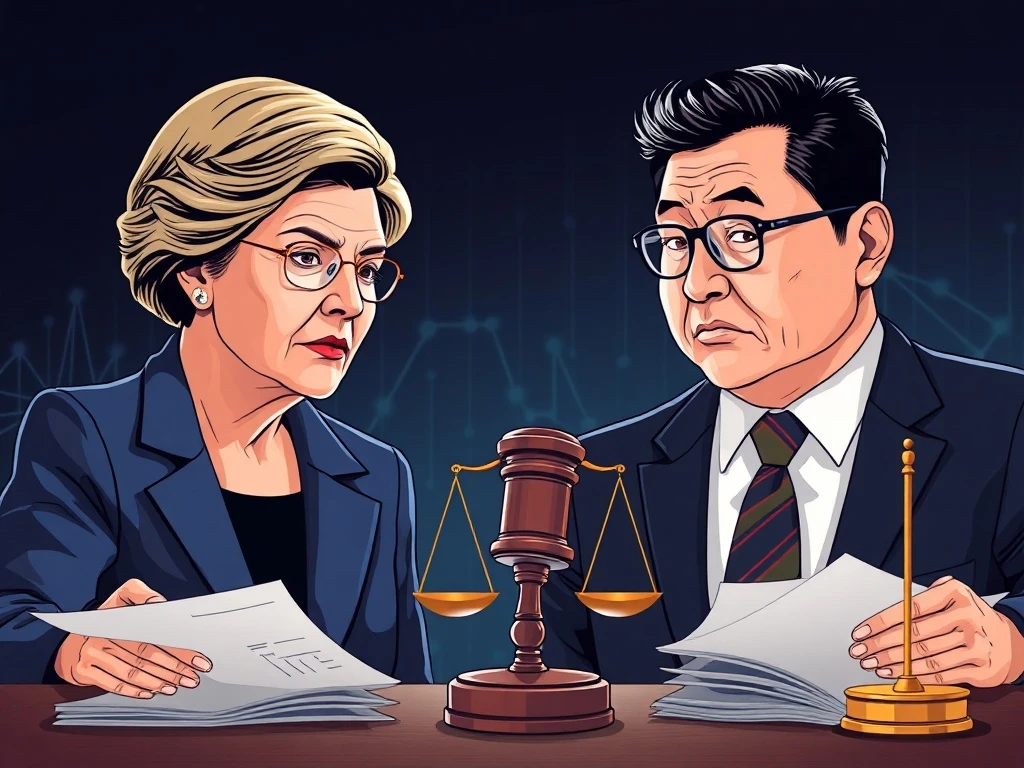Crucial Standoff: Elizabeth Warren CZ Defends Statements Against Defamation Threat

A significant legal challenge is unfolding within the cryptocurrency world. Senator Elizabeth Warren recently dismissed a defamation threat from Changpeng Zhao (CZ), Binance’s founder, as ‘without merit.’ This development follows former President Donald Trump’s controversial pardon of CZ. Many in the crypto community are closely watching this high-stakes exchange. It highlights the growing scrutiny on prominent figures and their alleged ties to political actions.
Elizabeth Warren CZ: The Defamation Threat Emerges
The controversy began after CZ secured a pardon from Trump. Reportedly, CZ’s lawyer, Teresa Goody Guillén, threatened to sue Senator Warren. The lawyer cited “defamatory statements” Warren made on X (formerly Twitter). Warren’s post, dated October 23, mentioned “corruption” in Trump’s pardon of Zhao. She also referenced “money laundering” charges. This prompted the legal team to demand the post’s removal.
However, Warren’s legal counsel quickly responded. Ben Stafford, her lawyer, stated that “any threatened defamation claim would be without merit.” Stafford’s letter, obtained by Punchbowl News, highlighted a key fact. Zhao pleaded guilty to violating an anti-money laundering law. Therefore, Warren’s statements reflected accurate public information. This legal back-and-forth draws significant attention to the actions of high-profile individuals.
Understanding the CZ Defamation Threat and Plea
Zhao pleaded guilty in November 2023. His offense involved failing to maintain an effective Anti-Money Laundering (AML) program at Binance. This violated the Bank Secrecy Act. A Seattle federal court later sentenced him to four months in prison in April 2024. Warren’s X post noted that Zhao “pleaded guilty to a criminal money laundering charge and was sentenced to prison.” CZ, days later, countered this online. He stated, “there were NO money laundering [charges].”
This distinction forms the core of the legal dispute. Warren’s lawyer clarifies that her post accurately referenced a violation of U.S. anti-money laundering law. It did not state, nor should it be construed to state, that he pleaded guilty to other specific money laundering charges. The focus remains on the AML program failure, a critical aspect of crypto regulation.
Trump Pardon Crypto: Allegations of Influence
Senator Warren’s X post also contained other serious allegations. She claimed Zhao “financed President Trump’s stablecoin and lobbied for a pardon.” This added to the criticism surrounding Trump’s decision. Reports have suggested ties between Binance and Trump’s family crypto venture, World Liberty Financial. Specifically, the Wall Street Journal and Bloomberg reported that Binance assisted in creating World Liberty’s stablecoin, USD1. This stablecoin was also reportedly used in a substantial $2 billion deal. This deal involved the Emirati state-owned investment firm MGX buying a stake in Binance in March.
Politico further reported on October 25 that Zhao’s pardon followed a costly, months-long effort. Binance and its legal team reportedly worked to influence key figures within Trump’s inner circle. These allegations raise questions about the integrity of political processes. They also highlight potential conflicts of interest within the burgeoning crypto space.
Binance Money Laundering and Public Scrutiny
The public nature of these allegations is significant. Warren’s X post received a “community note.” This crowdsourced comment outlined Zhao’s guilty plea. This feature on X allows users to add context to posts. It demonstrates the public’s active role in scrutinizing information. Such transparency tools contribute to a more informed discourse.
Warren’s lawyer, Stafford, firmly argued that her X post “is true in all respects and therefore cannot be defamatory.” He further asserted that it “accurately represented publicly available and widely reported facts.” Stafford emphasized a legal standard for defamation against public figures. He noted that a public figure like Mr. Zhao must present evidence of “actual malice” to prevail. This means proving the defendant published a false statement of fact with intent to harm or reckless disregard for the truth. This legal standard is difficult to meet.
The Broader Implications for Crypto Regulation
Zhao’s lawyer, Goody Guillén, reiterated his position. She stated that he “will not remain silent while a United States Senator seemingly misuses the office to repeatedly publish defamatory statements that impugn his reputation.” The letter demanded Warren retract statements from her X post and a Senate resolution. This resolution sought to denounce Trump’s pardon of Zhao. Failure to comply, the letter warned, could lead to Zhao pursuing “all legal remedies available.”
This entire episode underscores the ongoing challenges in crypto regulation. It showcases the intense legal and political battles surrounding the industry. As the cryptocurrency market matures, the interplay between influential figures, legal frameworks, and political power becomes increasingly complex. Such cases set precedents for how digital assets and their leaders are held accountable.
Key Takeaways from the Legal Dispute:
- Senator Elizabeth Warren dismissed a defamation threat from Changpeng Zhao (CZ).
- The threat stemmed from Warren’s X post regarding Trump’s pardon of CZ and alleged “money laundering.”
- CZ pleaded guilty to failing an Anti-Money Laundering program, not specific money laundering charges.
- Allegations include CZ’s ties to Trump’s stablecoin and lobbying efforts for the pardon.
- Warren’s lawyer maintains her statements are factual and not defamatory under the ‘actual malice’ standard.
The resolution of this standoff will likely influence future discussions on accountability and transparency in the digital asset space. It highlights the critical need for clear legal interpretations and robust oversight as crypto continues its integration into the global financial landscape.








